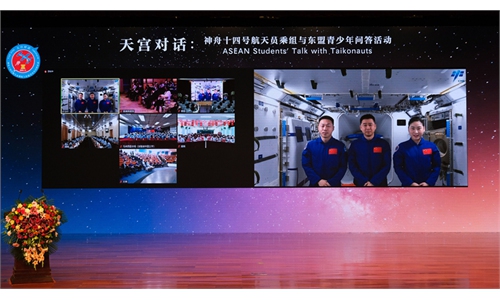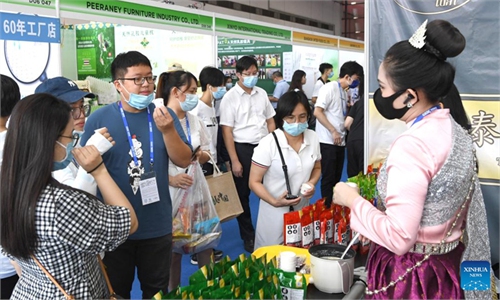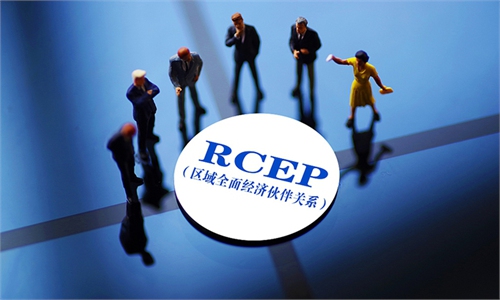Premier Li to attend ASEAN-hosted events ‘to further bilateral ties, show Asian wisdom and strength’
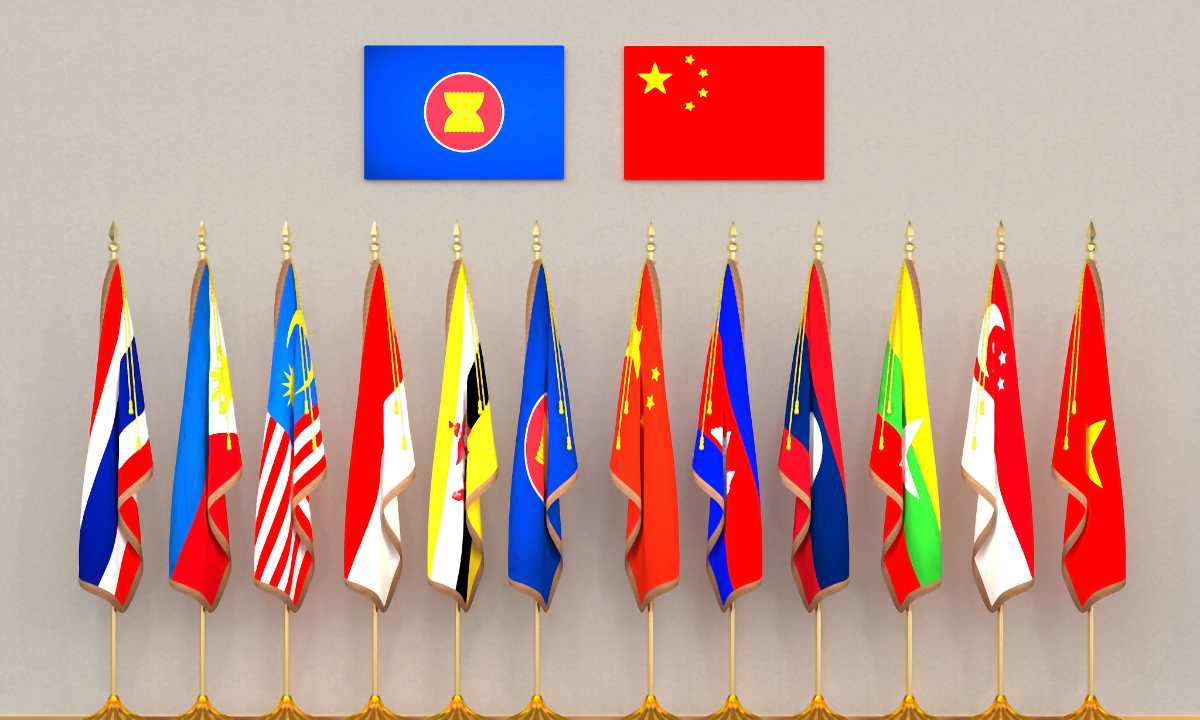
China ASEAN Photo:VCG
Chinese Premier Li Keqiang will visit Cambodia from November 8-13 to attend meetings with ASEAN leaders and pay an official visit to the country, as part of China's latest diplomatic interactions with Southeast Asia following Vietnamese leader Nguyen Phu Trong's China visit and Chinese Vice Premier Han Zheng's trip to Singapore.
The frequent interactions fully demonstrate the great importance China attaches to ASEAN in its neighboring diplomacy, and Li's visit will be another opportunity for the two sides to exchange development visions and jointly cope with challenges and uncertainties, showing Asian wisdom and strength, observers said.
Li will attend the 25th China-ASEAN Summit, the 25th ASEAN Plus Three (APT) Summit and the 17th East Asia Summit in Cambodia, Chinese Foreign Ministry spokesperson Zhao Lijian announced at Friday's press briefing.
China has several expectations for this meeting: to focus on the common development of the region and work together to address urgent challenges such as food and energy; to advance the process of East Asian economic integration, jointly implement the Regional Comprehensive Economic Partnership Agreement (RCEP) with high quality, and speed up the negotiation of the 3.0 version of the China-ASEAN Free Trade Area; and to safeguard regional peace and stability, adhere to multilateralism and open regionalism, support ASEAN's centrality, and build an open and inclusive regional cooperation structure, Zhao said on Friday.
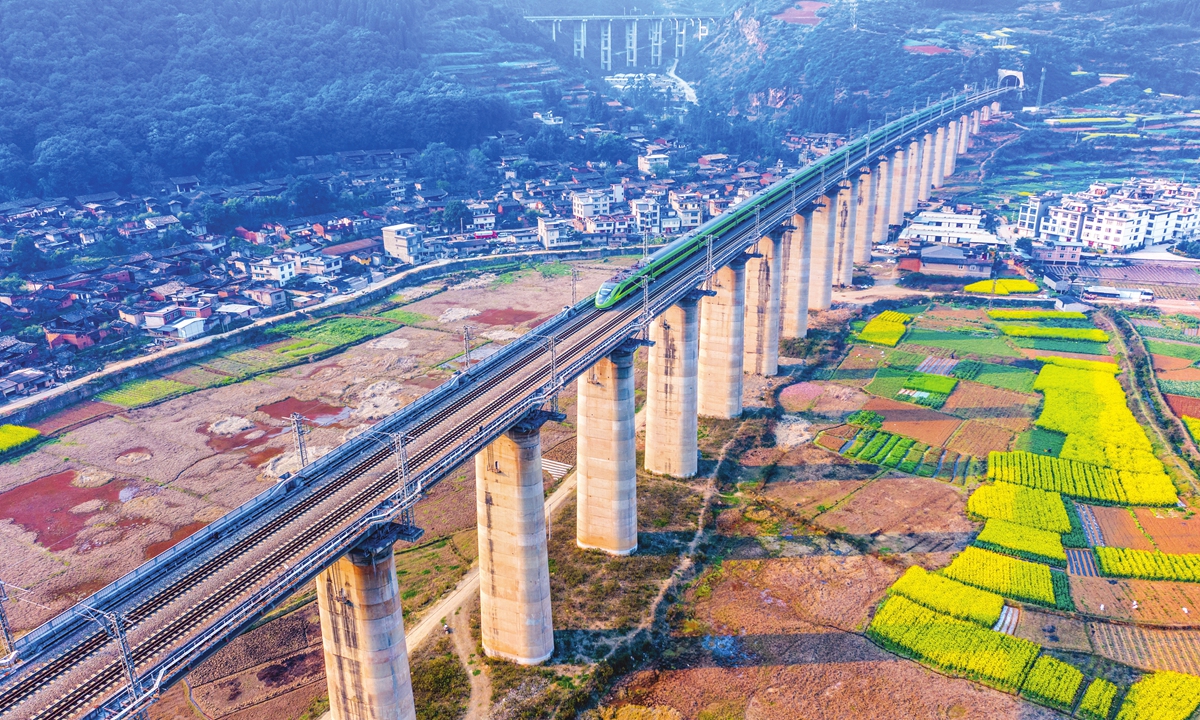
A high-speed train on a section of China-Laos Railway in Yuxi, Southwest China's Yunnan Province Photo: VCG
China and ASEAN have a long tradition of close and frequent high-level interactions, Ge Hongliang, director of the China-ASEAN Maritime Security Research Center at Guangxi University for Nationalities, told the Global Times on Friday.
The idea of a new Maritime Silk Road was proposed when President Xi Jinping visited Indonesia in 2013, from which the BRI took shape. Ge cited it as one example of how high-level interactions lay the foundation and chart the course for a sound relationship between China and ASEAN.
Based on mutual trust and on proper management of differences, China and ASEAN members "saw abundant fruits in their cooperation on security, economy and trade and many other fields," the expert said. China and ASEAN enhanced their relations to comprehensive strategic partnership in 2021.
Friday also marks the 20th Anniversary of the Declaration on the Conduct of Parties in the South China Sea (DOC), the first political document signed by China and ASEAN members, which "boosted mutual trust and created a favorable regional environment for the development of China-ASEAN relations," Zhao said.
Two decades of implementing the DOC fully demonstrated that China and ASEAN members have the capabilities, confidence and wisdom to properly handle the South China Sea issue, Zhao said.
A stable South China Sea contributes to joint prosperity - China has been ASEAN's largest trading partner for 13 consecutive years, while ASEAN started to top China's trading partner list in 2020 despite the COVID pandemic. The bloc remained China's top trading partner in the first nine months of 2022, accounting for 15.1 percent of China's total foreign trade.
The proceeding of the RCEP, the bustling trains and ships loaded with goods traveling between China and Southeast Asia, and flagship projects such as the Jakarta-Bandung High-Speed Railway, are all highlights of fruitful China-ASEAN cooperation.
Ge predicted the building of a high-quality BRI and bridging it with ASEAN's relevant development initiatives will dominate the agenda, such as green infrastructure. Regional coordination on supply chain and low carbon development are also important topics.
He also noted Premier Li's attendance of the ASEAN-themed events comes right after China made clear its future course at the key Party Congress to march toward the Second Centenary Goal of building China into a great modern socialist country by 2049.
China's modernization is not its own affair, but has great significance for the region and the world, observers said, mentioning the Global Development Initiative and Global Security Initiative.
As developing countries and emerging economies, China and ASEAN can have meaningful exchanges on development vision, Ge said, stressing that the two sides can jointly cope with regional and global challenges and uncertainties.
Recently, when hosting ASEAN envoys in Beijing, Chinese Foreign Minister Wang Yi said China stands ready to work with ASEAN countries to achieve common development and prosperity and to stride toward modernization together.
Noting several important multilateral meetings that ASEAN countries will host this year, including the G20 summit, APEC and the leaders' meeting on East Asia cooperation, Wang said that global governance will embrace an "Asian moment."
According to media reports, US President Joe Biden will also attend the East Asia Summit in Cambodia and G20 summit in Indonesia.
However, experts pointed out ASEAN will focus on what the US' "return" to the region can really bring about, rather than Washington's lip service and dangerous military moves.
China and ASEAN's common ground - regional peace and development - remains unchanged, and the two sides can overcome disturbances, continue with the mature cooperation framework, and see the relations move steadily and reach further, Ge said.
